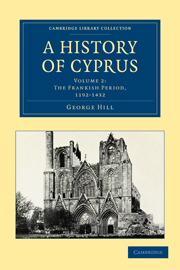Book contents
- Frontmatter
- Contents
- Preface
- List of Illustrations and Maps
- List of Books Referred to
- Chapter I The Frankish Foundation. Guy and Aimery de Lusignan, 1192-1205
- Chapter II Hugh I. Henry I to the end of the Longobard War, 1205-43
- Chapter III The Last Days of Frankish Syria, 1243–91
- Chapter IV From the Fall of Acre to the Restoration of Henry II, 1291–1310
- Chapter V From the Restoration of Henry II to the Death of Hugh IV, 1310–59
- Chapter VI Peter I, 1359–69
- Chapter VII Peter II. James I, 1369–98
- Chapter VIII Janus, 1398–1432
- Plate section
Chapter VII - Peter II. James I, 1369–98
Published online by Cambridge University Press: 13 June 2011
- Frontmatter
- Contents
- Preface
- List of Illustrations and Maps
- List of Books Referred to
- Chapter I The Frankish Foundation. Guy and Aimery de Lusignan, 1192-1205
- Chapter II Hugh I. Henry I to the end of the Longobard War, 1205-43
- Chapter III The Last Days of Frankish Syria, 1243–91
- Chapter IV From the Fall of Acre to the Restoration of Henry II, 1291–1310
- Chapter V From the Restoration of Henry II to the Death of Hugh IV, 1310–59
- Chapter VI Peter I, 1359–69
- Chapter VII Peter II. James I, 1369–98
- Chapter VIII Janus, 1398–1432
- Plate section
Summary
Peter (Perrin), Count of Tripoli, son of Peter I and Eleanor of Aragon, was a minor in his fifteenth year at the time of his father's death. He had two uncles, John, Prince of Antioch and Constable of Cyprus, and James, Constable of Jerusalem, afterwards King James I. The former, as the elder of these two relations, was offered the regency, which, after making a show of diffidence, he accepted.
The Haute Cour assembled immediately after the murder, on the same day, and without delay took steps to prevent future breaches of the Assises of the kind of which Peter I had been guilty. A committee of sixteen barons was appointed to draw up a text of the Assises on the basis of the book of John d'Ibelin, Count of Jaffa, which had been composed in 1265–6. They completed their work by November. Donations made by King Peter I which were contrary to the Assises were revoked, such as the gift of the fief of Athalassa, which Peter had made to his mistress Échive de Scandelion, and others to foreigners.
The Constable went to Famagusta to receive the oath on behalf of the King from the people there. Coming across Sir John de Moustry, who had gone out hunting, he brought him back to Nicosia. As an adherent of King Peter (see p. 365), Moustry was marked out for destruction, especially as he was suspected of an intrigue with the wife of Philip d'Ibelin, Alice of Majorca. Philip demanded his death, and he was arrested and sent to Kerynia.
- Type
- Chapter
- Information
- A History of Cyprus , pp. 370 - 446Publisher: Cambridge University PressPrint publication year: 2010First published in: 1948



